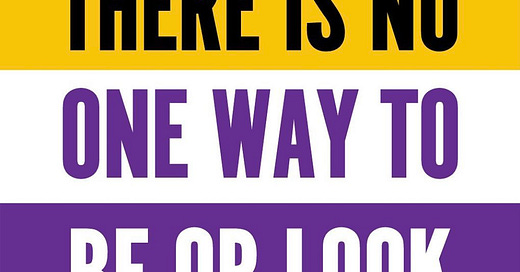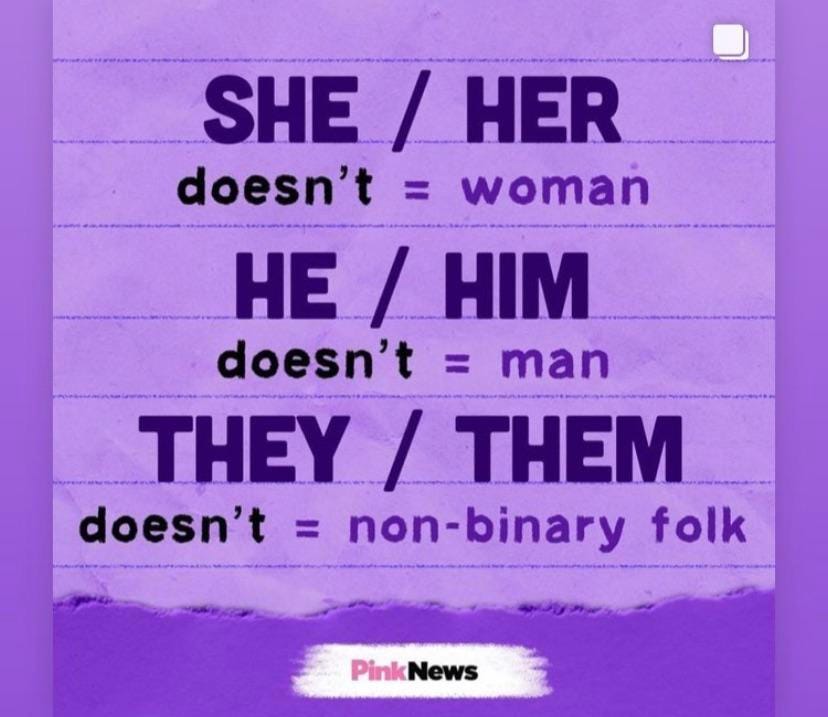There’s a regular bulletin put out by a workgroup I engage with. It contains all kinds of useful information about things going on in that department: training, advancement opportunities, reminders about procedures. But the most recent one came embedded with two incidents of binary pronoun usage that felt… out of place. That email sat in my inbox for days as I scrolled past it, sometimes stopping to read it again to feel that emotionally triggering sensation as I read the words “his/her” and “him/herself” in the instructions provided for on-job training of new employees.
Great, right? Inclusive of men and women. Very forward-thinking. If it’s 1992.
But this is 2023.
This should not be the moment when we’re establishing how to include women. We’re supposed to have that figured out. And yes, I do work in a male-dominant trade. Yes, we do have lots of problems about not including women in the workplace, not respecting them as professionals, behaving in misogynistic ways, encouraging male privilege… You get the picture.
But what about the people who don’t identify as a binary gender?
When I stare at the words “his/her” in that bulletin, something tightens in my gut. I am there. I am in the invisible space between those words. I am on both sides of that backslash. I am in the shift from right to left. I am “yes,” and I am “no.” I am both and neither.
In the keyboard that is life, I am the asterisk. *
Not quite a boy. Definitely not a girl. Never a woman. Now a parent.
Sometimes an adult. A transman. A nonbinary guy. An enby.
He/Him.
Possibly they/them.
Where am I in that bulletin? How am I to find myself? I cannot possibly be the only one to see this and have these same thoughts. I know better. I was alone as a kid, but I’m not alone now as an adult. The world has lots of people like me in it.
I wish I could find a way to articulate the feelings around having a nonbinary gender identity, especially if you do not know that sensation, the understanding that there is some part of your that can never fit the ways in which our world has crafted language and culture and social expectations. It’s not just a feeling that you bend the rules as a man or woman, that you’re okay with painting your nails and using power tools at the same time. It is not just in the blurring of where any of us fits in the roles we have been assigned (mother, father, teacher, student, employee, public servant, union member, writer, clergy, fill in your own blank here ______ ).
It is me as a child holding my blanket and naming them Sam because I know, deep down inside, how painful it is to be made to choose what you are, to be deprived of that choice, to have to be one thing or another when maybe you’re not. Sam got to choose his own gender, and it took him several years. He was neither/both for a long time. But I made space for him to take that time and think about his feelings because I wanted that space given to myself.
I still need that space.
When I decided that transitioning felt like the right thing for me, I considered my pronoun options. I went over them in my mind for days, possibly weeks, trying to imagine what would feel good, what felt right.
I still cannot answer that question today.
The choice I made to ask for he/him pronouns was born of the knowledge that…
I could not keep hearing she/her. It was literally killing me.1
Getting anyone to comply with they/them pronouns would be a nightmare. And I needed a solution that would actually work in my lifetime.
Placing my nonbinary identity at the forefront with they/them pronouns would allow people in my life to keep seeing me as female.2 But asking for he/him would force them to recognize that this was not business as usual, that I was genuinely in need of their behavior to change in accordance with my need to express myself as a real person.
By the way, if you’re the kind of person who willingly uses they/them pronouns for someone you know, someone in your life or family, I am so grateful you are in this world with me. You are the exception, and you’re making space for me. Thanks for that.
They/them is just how some girls identify, right?
This. This is such a problem. And I knew if I promoted the importance of my nonbinary identity that it would be an easy slide from her to them with no acknowledgement of what I am not, of what I have never been, of what I will never be. There is an obvious equation that happens in the minds of people. If you’re not a girl, then you’re a boy. Those are the only options.
So if I say I am not a girl, then what does that make me?
A boy, you say.
But what if that’s simply where my definition stops? At “not girl”? Could that ever be enough?
When there are only ever two choices, where does the person with option three go?
Aren’t all nonbinary people androgynous?
No.
I wish that was justification enough. Can it be?
How do I explain that androgyny is an expression and nonbinary is an identity and that the two are not necessarily intertwined, equivalent, or concurrent? I am not androgynous. Maybe that is its own form of privilege, of having a body or a face that looks like it could be anything, either, both, neither. Few of us are born with that.
Nonbinary people can look any damn way we want, and we come in all of the shapes, sizes, and colors that this world creates. We can decide whatever pronouns feel right to us, including they/them or anything else. There are no requirements. There are no rules. That’s the point.
And no, this isn’t some gen X punk moment to tell off the establishment (though that’s a nice sentiment). I am not “being nonbinary” to buck the system, to show how the gender binary doesn’t fit anyone. I agree with those ideas, but my identity isn’t an idea, and it isn’t a protest. I’m a kid grown into adult form who has spent his entire life never fitting in for more than a fleeting moment, but I just cannot stop looking for that place where I can be what I am without it creating a problem.
In that moment with Sam clutched in the safety of my arms, I wished with my whole being for a third gender. I needed it. It would come with its own pronouns and language. It would solve so many problems. It would give me a place to belong, a thing to be that others would know and understand and love. It would not require me to change or fit in. It would be home.
Did I wish for a third gender for myself because some part of society had told me I could not be a boy? Was I already wise to cultural norms as a tiny kid clutching his blanket? And, had I been given one person in my life who could have told me that being a boy was okay, would I have felt that need for a third choice?
I’m plagued by these thoughts, and there’s no solution.
When I talk to other trans* folks, I hear so many of them talk about knowing, definitively knowing, at a young age that they were a boy or a girl. It was clear to them.
I don’t have that clarity.
I only know that I am not what I was told to be.
The manager who wrote that bulletin at work has no idea that they are not being inclusive. They don’t see or feel the harm they are creating. And maybe I’m the only one who will ever feel it.
But I am enough.
And I am not alone.
Neither are you.
I’m working with another ally in the company to find a tactful way to approach this, to demonstrate to managers that there are other ways to write bulletins and policies using inclusive methods built on today’s standards. If there’s someone out there who is considering coming out as nonbinary, I want them to see that I care, that I’m willing to ask for these changes in language to make space for them, too.
Your trans friend,
Robin
I sincerely hope you never understand the feeling of dysphoria over hearing the wrong pronouns for yourself. It is excruciatingly painful. My body cringes. Sometimes it creates nausea or intense headaches. Muscles tighten involuntarily. I make myself smaller, as though recoiling from being hit. And all of the hurt from those small words turns inward, taking itself out on my body.
So many times I have heard someone say, “Oh yeah, she’s nonbinary now.” And that sums the whole thing up.







![product] A shirt to support those who gender identify as non binary, in men's and women's styles.... : r/pointlesslygendered product] A shirt to support those who gender identify as non binary, in men's and women's styles.... : r/pointlesslygendered](https://substackcdn.com/image/fetch/$s_!I3o4!,w_1456,c_limit,f_auto,q_auto:good,fl_progressive:steep/https%3A%2F%2Fsubstack-post-media.s3.amazonaws.com%2Fpublic%2Fimages%2F2ab224ae-d009-4de0-9d92-1bf1ed1b825d_1170x785.jpeg)
Robin, thank you so much for writing this. I pulled out so many quote that hit me hard, but now that I look at them, I realize it's practically half of your essay! I was in the ER recently for what turned out to be a panic attack and spent far longer there than should have been necessary because every. single. person. misgendered me AND my wife the entire time, so instead of being able to reground, my anxiety just kept getting worse. The line in your note "And all of the hurt from those small words turns inward, taking itself out on my body." describes exactly what it feels like.
Sounds like even though you know who you are that society in general does not. I see nothing wrong with wanting to be identified as the person you are.